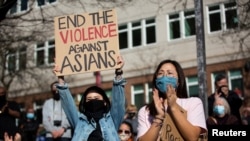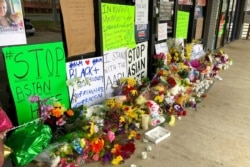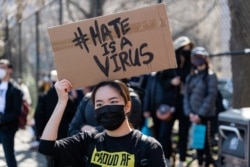For many Americans, a 21-year-old white man has become the face of anti-Asian violence that has swept the country over the past year. That impression may be misleading.
Robert Aaron Long, the son of a southern Baptist lay leader from Canton, Georgia, is accused of murdering eight people, including six Asian American women, at three spas in the Atlanta metropolitan area last week.
The one-time Bible-carrying high school drummer and video fanatic who later dropped out of college and became a self-described sex addict, has not been charged with committing a hate crime, despite demands by many in the Asian community to do so.
Long has told police he launched his killing spree to eliminate sexual “temptation,” not to target the Asian community. While investigators have yet to determine a motive in the case, many of those who carry out attacks on Asian Americans do not fit Long’s racial profile.
In New York City, where anti-Asian hate crime soared nearly nine-fold in 2020 over the year before, only two of the 20 people arrested last year in connection with these attacks were white, according to New York Police Department data analyzed by the Center for the Study of Hate and Extremism. Eleven were African Americans, six were white Hispanics and one was a Black Hispanic.
"I thought it was jarring," said Brian Levin, executive director of the center, noting that the finding runs counter to assumptions made by many that perpetrators of anti-Asian hate are mostly angry white men who blame China for the COVID-19 pandemic.
Hate crime perpetrators
A hate crime is defined by the FBI as a criminal offense motivated by bias against the victim’s race, religion, disability, sexual orientation, ethnicity, gender or gender identity. While historically whites have been responsible for most hate crimes reported to the FBI, the arrest data from New York shines a light on a sensitive topic in the Asian American community — that attacks on Asians are often carried out by people of color.
Most police departments do not publish this kind of data, but anecdotal evidence suggests the pattern seen in New York has emerged in other cities, as well.
“What is not being discussed in a way is, what is the background of the perpetrators and who is getting charged with these hate crimes,” said Chris Kwok, board member of the Asian American Bar Association of New York.
In New York, one of the seven Latinos arrested in anti-Asian attacks last year was a 44-year-old man who allegedly harassed and hit a Hong Kong-born man in Queens.
Among the 11 African Americans arrested last year was a group of four teenage girls charged in April with hate crimes after attacking a 51-year-old Asian woman on a bus in the Bronx while accusing her of causing the COVID-19 virus. One of the teens struck the woman in the head with an umbrella. Prosecutors later dropped hate crime charges against the other three.
Of the two white suspects arrested, one was a woman. In March, Lynn Ferguson, 33, was charged with hate crimes after she bumped into an Asian woman in Manhattan, spat on her and pulled her hair, declaring, “You’re the reason why the coronavirus is here!”
Several factors may explain the relatively high number of non-white arrests in New York City, Levin said. One is the city’s racially diverse urban population. Proportionally, the city has 57% more Latinos, 81% more African-Americans, 139% more Asians and about 50% fewer whites than the nation as a whole, with whites often living in less racially mixed neighborhoods, according to Levin. What’s more, African Americans are more frequently arrested than whites, and many whites involved in anti-Asian hate crimes may be at large, he noted.
In response to the surge in anti-Asian hate incidents, the New York Police Department created a task force last year. Asked about the anti-Asian hate crime perpetrators’ backgrounds, Deputy Inspector Stewart Loo, the task force head, said he could not confirm the statistics, “but they are often misleading.”
“I can only give the facts that I know, which is this task force was created by Asian and Black ranking officers within the NYPD,” Loo said in an email. “Leaders of the Black community were the first and most vocal in publicly condemning the surge in hate crimes against Asians.”
Jack McDevitt, a sociology professor at Northeastern University and co-author of two books on hate crimes, cautioned against reading too much into the data.
"When you look at the data nationally, in any given community in any given year, you can have an anomalous number of hate crimes reported to the police because so many are not reported,” he said.
Nevertheless, noting that most hate crime perpetrators tend to be white, McDeVitt added that “other communities have modeled their attacks on what we white folks have been doing for a long time now.”
While Asian Americans are not strangers to hate and discrimination, anti-Asian hate crimes spiked by nearly 150% in major U.S. cities last year, exacerbated by former President Donald Trump’s anti-China rhetoric, as VOA first reported in March.
Trump and his spokesmen have denied the former president’s repeated use of terms such as "kung flu," to refer to the coronavirus, was racist. And conservative commentators have seized on the recent spate of anti-Asian attacks involving African Americans, some of them captured in viral social media videos, to downplay Trump’s role.
"The recent crime wave against Asians in America's big cities is not the fault of Donald Trump, MAGA activists, conservative talk radio, or white people," right-wing Asian American commentator Michelle Malkin wrote recently. “It's the fault of the perpetrators and the perpetrators alone — most of whom happen to be thugs 'of color.'"
But Asian American community leaders and experts say the hate directed at their community cannot be delinked from Trump’s vitriol.
"When you have a former president who stoked the flames of white nationalism by using ethnic slurs to refer to the coronavirus, you're going to incite hate against a vulnerable minority, in this case, Chinese Americans, and by extension, Asian Americans," said Jennifer Lee, a sociology professor at Columbia University in New York.
Lee said that blaming African American men for the anti-Asian hate spree is misguided.
"The tropes of Black criminality and Black-Asian conflict made it all too convenient for viewers to reduce anti-Asian hate crimes to conflict between two minority groups," Lee said, referring to recent video footage that appears to show Black men attacking Asians.
Divided community
The surge in anti-Asian hate crimes has divided the Asian community over the appropriate law enforcement response.
Progressives oppose tougher police action over concern it could lead to a disproportionately high number of African American and Latino arrests without putting a stop to the hate. Lee cited data showing that an increase in arrests in Asian neighborhoods in four major U.S. cities last year did not deter anti-Asian hate incidents.
Others, however, say the surge in hate crimes warrants stepped-up prosecutions.
"I certainly understand the desire not to unfairly criminalize African American and Latinos, but I think we also need to have accountability for these attacks," Kwok said.






